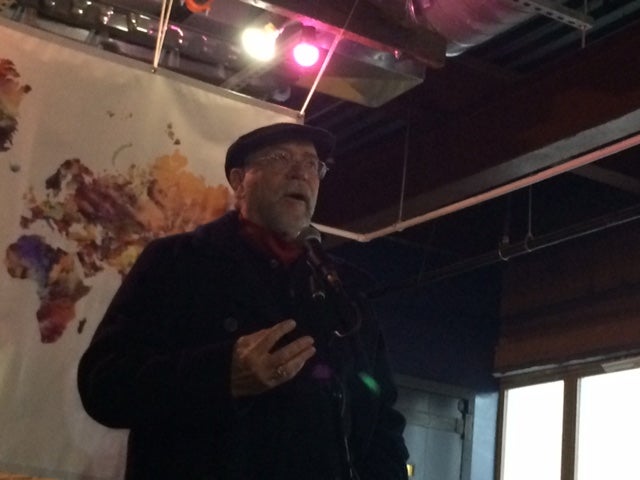Lancaster residents call for supporting refugees after Trump’s ban

Lancaster Mayor Rick Gray told the crowd at a refugee benefit at Tellus360 Sunday: "Don't give into fear. Give into love." (Emily Previti/WITF)
Per capita, the number of refugees that resettled in Lancaster was 43 times higher than the United States overall last year.
Protests erupted all over the country in response to President Trump’s executive order on travel and immigration that included a complete ban on refugee resettlement for 120 days, and on Syrian refugees indefinitely.
A benefit for refugees in Lancaster had been planned for months, but the past few days’ events heightened supporters’ sense of urgency. The city’s long been known as a hub for refugees, resettling 31 times more per capita than the rest of the country last year and recently being dubbed the nation’s resettlment capital due to these sorts of statistics.
Hundreds of people packed Tellus360, a popular local nightspot on Sunday, for the Concert for Refugees, including City Councilman James Richenbach.
“We’re stronger as a community, we’re stronger because of diversity, we’re stronger because we love each other,” Reichenbach said. “And the reality is at some point, forgive the pun, the love is gonna trump the hate. And everyone will get on board and realize we’re doing it the right way.”
Lancaster is also known for its dramatic downtown revitalization over the past decade or so, despite pockets of poverty and lots of untaxable government property.
Sam Bressi, who heads the Lancaster County Community Foundation, says the city’s success is partly due to its long tradition of welcoming refugees and immigrants.
“We’re the envy of the rest of Pennsylvania. They look at this city and they say, what are they doing right? This is what we’re doing right, this is a big part of what we’re doing right,” Bressi said.
No refugees bound for Lancaster were among those stranded in airports nationwide this weekend, according to Sheila Mastropietro, who runs resettlement agency Church World Service’s Lancaster office.
But she says three families due to arrive in February now won’t be able to come.
Nearly 68,000 refugees are in a similar situation: cleared for security with travel to the U.S. booked before Friday canceled all that, according to Church World Service’s Immigration Policy Advocate Meredith Owen.
Safety and national security are the main reasons cited for Trump’s order, but critics say the vetting process for refugees already is robust.
It entails interviews with intelligence and security officials, according to Refguee Council Melanie Nezer, vice-president ce president for policy and advocacy for HIAS.
There are medical screenings, background checks and fingerprinting. Some refugees have their irises scanned, Nezer says.
And clearances already obtained by refugees going through the process could expire in the next three months, setting people back months or even years, according to Mastropietro.
“They’re in situations that are unstable, and they’re going to be kept in those situations for longer,” she said.
Mastropietro spoke as the benefit in Lancaster was getting underway. She said the donations could help prevent program cuts and layoffs that could start as soon as April, depending on what happens with the federal budget.
The agency oversees refugees’ arrival, coordinating with prospective employers and getting them settled with housing that’s furnished mainly with donations, and rent covered by federal funding for a few months when they arrive. It also runs several programs serving refugee families for as long as five years after their arrival.
While Mastropietro, her colleagues and their clients get a lot of support, resettlement in Lancaster isn’t free of controversy.
Protestors traveled from all over Pennsylvania and even bordering states like New Jersey and New York to demonstrate against resettlement outside Church World Services’ office about a year ago.
The School District of Lancaster also is fighting a federal lawsuit over its treatment of older teenagers with limited English proficiency. That lawsuit was filed by the ACLU on behalf of a group of student refugees. The school district, where 98 percent of children come from impoverished households, gets about $70,000 a year from the federal government to support hundreds of student refugees who speak dozens of languages and often arrive at school with advance notice that’s vague or short on details.
And although the city is solidly Democratic, Republicans dominate in surrounding communities, and Lancaster County went for Trump last November.
Editor’s note: This story has been updated to correct Lancaster’s relative per capita resettlement. The original figure was provided by the state Office of Refugee Resettlement and included Cuban entrants (who receive the same benefits and are supported by the same agencies as refugees, but do not have refugee status under federal law).
WHYY is your source for fact-based, in-depth journalism and information. As a nonprofit organization, we rely on financial support from readers like you. Please give today.



